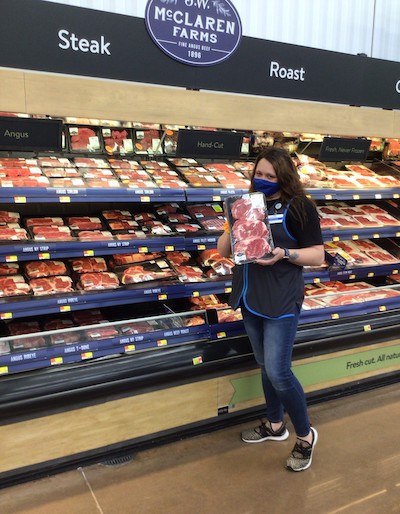As part of ongoing efforts to build a transparent, sustainable supply chain for high-quality beef, Walmart plans to acquire a minority stake in Sustainable Beef LLC, a rancher-owned company based in North Platte, Nebraska.
Financial terms of the agreement, announced Wednesday, weren’t disclosed. Walmart said the investment will help Sustainable Beef open its angus beef processing plant in North Platte, Neb. Plans call for the $325 million project to break ground next month and open by late 2024. The more than 500,000-square-foot plant is expected to process 1,500-plus cattle per day and create over 800 new jobs.
Walmart noted that its work with Sustainable Beef will drive more capacity for the beef industry. With the investment, Walmart also will have representation on Sustainable Beef’s board.
 Walmart announced plans to develop its own angus beef supply chain in 2019 via a partnership with McLaren Farms, with products under that label rolling out to selected stores last year. (Photo courtesy of Walmart)
Walmart announced plans to develop its own angus beef supply chain in 2019 via a partnership with McLaren Farms, with products under that label rolling out to selected stores last year. (Photo courtesy of Walmart)
“We are dedicated to providing high-quality, affordable beef to our customers, and an investment in Sustainable Beef LLC will give us even more access to these products,” Tyler Lehr, senior vice president of merchandising for deli services, meat and seafood at Walmart U.S., said in a statement. “We know Sustainable Beef LLC has a responsible approach to beef processing, one that includes creating long-term growth for cattle ranchers and family farmers. This investment provides greater visibility into the beef supply chain and complements Walmart’s regeneration commitment to improve grazing management.”
Bentonville, Ark.-based Walmart unveiled its plan to enter the angus beef business in 2019. The program is aimed at supplying Walmart shoppers with a selection of high-quality beef plus added transparency and sustainability in sourcing.
The retail giant began creating its own supply chain to sell no-hormone-added angus beef cuts at stores in the Southeast, working with Texas rancher Bob McClaren of 44 Farms and Prime Pursuits to source cattle raised on family farms and ranches. Creekstone Farms processes the cattle at its facility, and FPL Foods operates Walmart’s case-ready packing plant in Georgia, where the meat gets packaged and sent to the stores. The 201,000-square-foot packing facility, in Thomasville, Ga., opened in early 2020.
In mid-2021, the McClaren Farms label launched at nearly 500 Walmart stores in Alabama, Florida, Georgia, Mississippi and South Carolina. The line includes specialty cuts such as USDA Choice Angus filet mignon, T-bone, porterhouse, ribeye, short ribs and chuck roast, among other beef selections, at everyday low prices. All of the beef is U.S. rancher-raised, with no hormones added.
Walmart’s beef sourcing model is designed to add visibility into each step of the supply chain via partnerships with best-in-class suppliers. The model, such as with McClaren Farms, also supports ranchers by driving steady demand and stability in the beef marketplace, while giving consumers access to high-quality beef at an affordable price, according to Walmart.
North Platte-based Sustainable Beef will work with cattle feeders and ranchers to bolster key elements of the supply chain, such as grain sourcing and grazing management. Walmart said animal care will follow the Five Freedoms and antibiotic use and reporting across herds in line with Walmart’s position on antibiotics in animals, which urges suppliers to adopt and implement American Veterinary Medical Association Judicious Use Principles of Antimicrobials.
“We set out on a journey two years ago to create a new beef processing plant to add some capacity to the industry and provide an opportunity for producers to integrate their business of raising quality cattle with the beef processing portion of the industry and do it in a sustainable manner,” according to David Briggs, CEO of Sustainable Beef. “During this journey, we found that Sustainable Beef and Walmart aligned on continuing to improve how we care for our animals and crops and provide consumers the positive experience of enjoying quality beef.”
Last August, Walmart rolled out a new set of goals for Walmart U.S. and Sam’s Club to source beef products more sustainably, part of the company’s plan to source 20 key commodities more sustainably by 2025. The retailer also has beef sustainability efforts under way in Canada. This past October, Walmart Canada said it purchased the largest known quantity of beef from certified sustainable Canadian farms and ranches ever sourced by a single retailer. The beef purchase is aimed at supporting the environmental, social and economic sustainability of Canadian farmers and ranchers whose operations are certified through a third-party audited system, in accordance with sustainability standards set by the Canadian Roundtable for Sustainable Beef (CRSB), Walmart Canada reported.


